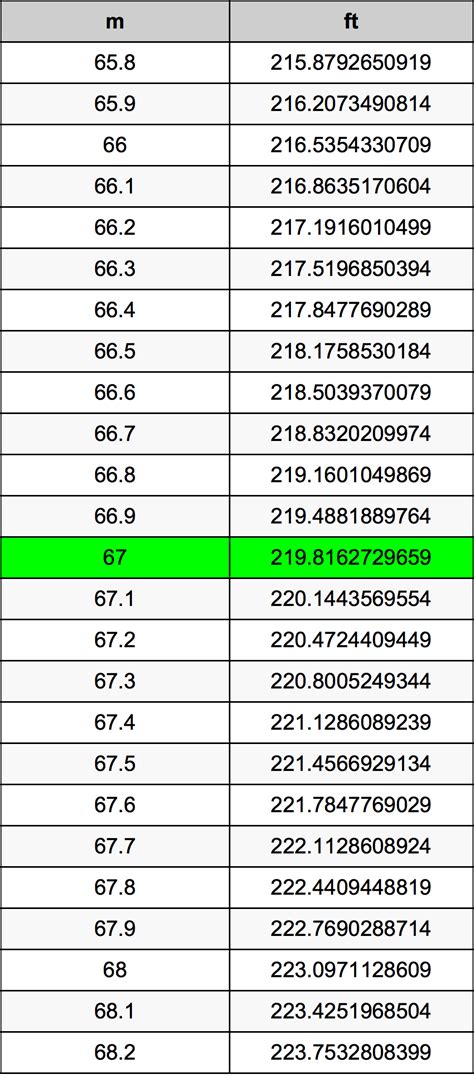67 Meters to Feet: Quick Conversion Guide

In a world where measurements can vary by region, understanding how to convert units is an essential skill. Whether you’re an architect working on an international project, a traveler trying to grasp local dimensions, or simply someone curious about the world, knowing how to convert meters to feet is incredibly useful. This guide will walk you through the process, provide practical examples, and offer tools to make conversions effortless.
The Basics: Meters and Feet
Before diving into the conversion, let’s clarify what these units represent. The meter (m) is the base unit of length in the International System of Units (SI), widely used around the globe. It’s defined as the distance light travels in a vacuum in 1⁄299,792,458 of a second. On the other hand, the foot (ft) is a unit of length in the imperial and US customary systems, historically based on the human foot. One foot is equivalent to 12 inches.
The Conversion Factor
To convert meters to feet, you’ll need the conversion factor:
1 meter = 3.28084 feet.
This ratio is derived from the international yard, which is defined as exactly 0.9144 meters.
Converting 67 Meters to Feet
Now, let’s apply this factor to convert 67 meters to feet:
1. Multiply the number of meters by the conversion factor:
67 meters × 3.28084 feet/meter = 219.81532 feet.
2. Round to a practical number of decimal places, typically two:
67 meters ≈ 219.82 feet.
Why This Conversion Matters
Understanding this conversion is more than just a mathematical exercise. It has real-world applications:
- Construction and Engineering: Professionals often work with both metric and imperial units, depending on the project’s location.
- Travel: Knowing how tall a building or mountain is in feet can help you visualize it better if you’re accustomed to the imperial system.
- Sports: Track and field events, for instance, often use meters, but spectators in the US might prefer feet for easier comprehension.
Practical Examples
To illustrate, consider these scenarios:
1. Building Height: The Eiffel Tower stands at approximately 324 meters. Converting this to feet gives 1,063 feet, which is easier to compare with structures like the Empire State Building.
2. Running Track: A standard Olympic running track is 400 meters long. In feet, that’s about 1,312 feet, helping athletes from different regions understand the distance.
Tools for Quick Conversions
While manual calculations are straightforward, digital tools can save time:
- Online Converters: Websites like RapidTables or UnitConverters offer instant conversions.
- Smartphone Apps: Apps like “Unit Converter” or “Convert Units” provide on-the-go solutions.
- Voice Assistants: Ask Siri, Google Assistant, or Alexa, “How many feet are in 67 meters?” for a quick answer.
Common Mistakes to Avoid
- Using the Wrong Factor: Ensure you’re using 3.28084, not a rounded value like 3.3, for precision.
- Forgetting to Round: Depending on the context, rounding to two decimal places is usually sufficient.
- Mixing Units: Always double-check whether you’re converting meters to feet or vice versa to avoid errors.
Historical Context
The meter and foot have fascinating histories. The meter was first introduced during the French Revolution as part of the metric system, designed to standardize measurements. The foot, however, has roots in ancient civilizations, with its length varying until it was standardized in the 20th century.
Future Trends
As the world becomes more interconnected, the need for seamless unit conversions will only grow. Advances in technology, such as AI-powered tools and augmented reality apps, may soon allow for real-time, context-aware conversions.
What is the exact conversion of 67 meters to feet?
+67 meters is exactly 219.81532 feet when using the precise conversion factor of 3.28084 feet per meter.
Why do some countries use meters while others use feet?
+The meter is part of the metric system, adopted by most countries due to its simplicity and scientific basis. The foot, part of the imperial system, remains in use primarily in the United States, the UK, and a few other regions due to historical and cultural reasons.
Can I convert meters to feet without a calculator?
+Yes, by multiplying the number of meters by 3.28084. For quick estimates, you can use 3.3 as a rounded factor, though it’s less precise.
How does the height of a 67-meter building compare to famous landmarks?
+A 67-meter building (approximately 219.82 feet) is slightly taller than the Statue of Liberty, which stands at 151 feet without its pedestal.
Conclusion
Converting 67 meters to feet is a simple yet powerful skill that bridges the gap between different measurement systems. Whether for professional or personal use, mastering this conversion ensures you’re prepared for any situation. With the right tools and knowledge, you’ll never be left guessing about dimensions again.

